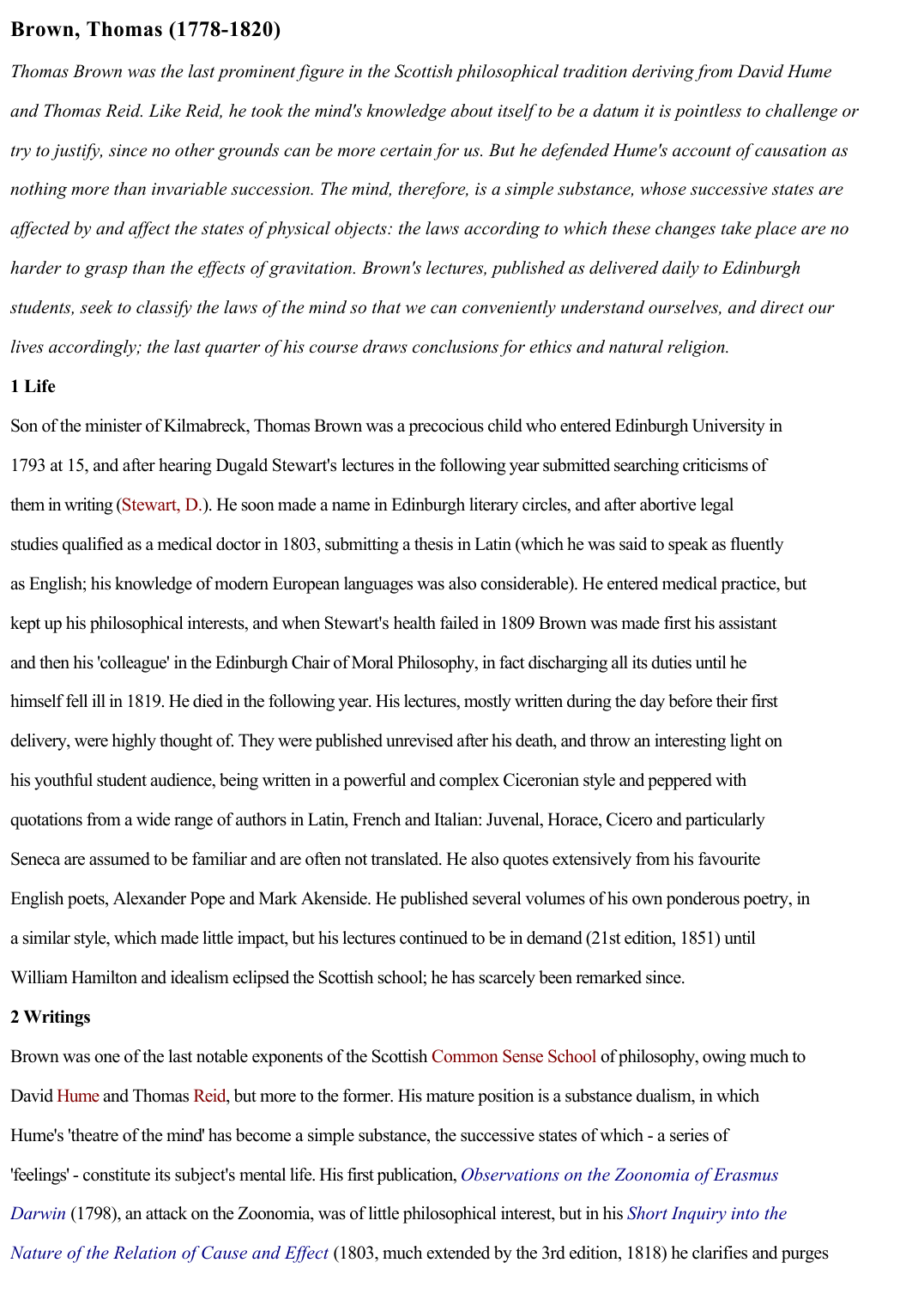Brown, Thomas
Publié le 16/05/2020

Extrait du document
«
Brown, Thomas (1778-1820)
Thomas Brown was the last prominent figure in the Scottish philosophical tradition deriving from David Hume
and Thomas Reid.
Like Reid, he took the mind's knowledge about itself to be a datum it is pointless to challenge or
try to justify, since no other grounds can be more certain for us.
But he defended Hume's account of causation as
nothing more than invariable succession.
The mind, therefore, is a simple substance, whose successive states are
affected by and affect the states of physical objects: the laws according to which these changes take place are no
harder to grasp than the effects of gravitation.
Brown's lectures, published as delivered daily to Edinburgh
students, seek to classify the laws of the mind so that we can conveniently understand ourselves, and direct our
lives accordingly; the last quarter of his course draws conclusions for ethics and natural religion.
1 Life
Son of the minister of Kilmabreck, Thomas Brown was a precocious child who entered Edinburgh University in
1793 at 15, and after hearing Dugald Stewart's lectures in the following year submitted searching criticisms of
them in writing ( Stewart, D. ).
He soon made a name in Edinburgh literary circles, and after abortive legal
studies qualified as a medical doctor in 1803, submitting a thesis in Latin (which he was said to speak as fluently
as English; his knowledge of modern European languages was also considerable).
He entered medical practice, but
kept up his philosophical interests, and when Stewart's health failed in 1809 Brown was made first his assistant
and then his 'colleague' in the Edinburgh Chair of Moral Philosophy, in fact discharging all its duties until he
himself fell ill in 1819.
He died in the following year.
His lectures, mostly written during the day before their first
delivery, were highly thought of.
They were published unrevised after his death, and throw an interesting light on
his youthful student audience, being written in a powerful and complex Ciceronian style and peppered with
quotations from a wide range of authors in Latin, French and Italian: Juvenal, Horace, Cicero and particularly
Seneca are assumed to be familiar and are often not translated.
He also quotes extensively from his favourite
English poets, Alexander Pope and Mark Akenside.
He published several volumes of his own ponderous poetry, in
a similar style, which made little impact, but his lectures continued to be in demand (21st edition, 1851) until
William Hamilton and idealism eclipsed the Scottish school; he has scarcely been remarked since.
2 Writings
Brown was one of the last notable exponents of the Scottish Common Sense School of philosophy, owing much to
David Hume and Thomas Reid , but more to the former.
His mature position is a substance dualism, in which
Hume's 'theatre of the mind' has become a simple substance, the successive states of which - a series of
'feelings' - constitute its subject's mental life.
His first publication, Observations on the Zoonomia of Erasmus
Darwin (1798), an attack on the Zoonomia, was of little philosophical interest, but in his Short Inquiry into the
Nature of the Relation of Cause and Effect (1803, much extended by the 3rd edition, 1818) he clarifies and purges.
»
↓↓↓ APERÇU DU DOCUMENT ↓↓↓
Liens utiles
- La philosophie est la servante de la théologie. Péguy (saint Thomas d'Aquin)
- Thomas S. Kuhn : La Structure des révolutions scientifiques (résumé et analyse)
- Thomas Hart Benton
- Thomas Wolfe
- Jim Brown.


